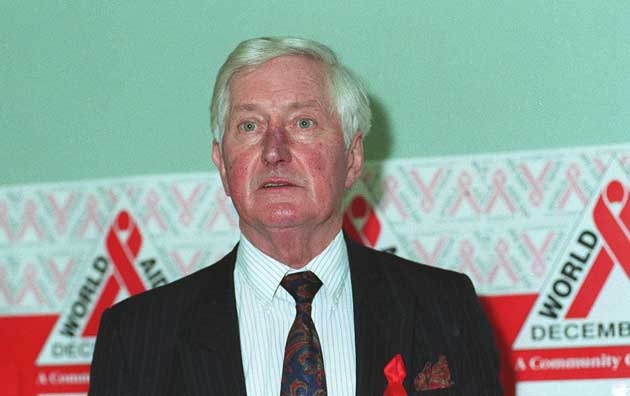Lord Kilmarnock: Writer and politician who also helped care for Kingsley Amis in the novelist's later years

Men who have been employed as butlers rarely rate an entry in newspaper obituary pages, even when they have served distinguished literary figures such as the novelist Kingsley Amis. But then Alastair Ivor Gilbert Boyd was hardly in the usual run of butlers, possessing as he did a variety of other noteworthy characteristics. He was, after all, in Who's Who and was a gifted writer, member of the House of Lords, political spokesman and head of his own ancient Scottish clan.
The natural assumption would be that someone with the title of Lord Kilmarnock would probably have his own butler rather than act as one. Yet he was content to serve in that capacity for many years, bringing Kingsley Amis breakfast and making his bed. It was a mixture of matrimony and money, along with Amis's notoriously curmudgeonly personality, which led Alastair Boyd, seventh baron of Kilmarnock, who had been a pageboy at the coronation of George VI, to find work as a butler. In 1977 he married Hilly Bardwell. This was his second marriage, her third: her first husband was Amis, with whom she had three children, including the novelist Martin Amis.
After 15 years Hilly, tired of Kingsley's relentless womanising and general boorishness, divorced him and found a second husband. But this, too, was an unhappy marriage, during which she met and eventually married Alastair Boyd. Amis, meanwhile, re-married, this time to the novelist Elizabeth Jane Howard, but this, too, ended in separation. In his London house, neurotic about living alone, Amis lamented: "Where the hell am I going to get the sort of companion-housekeeper I need?"
The answer, extraordinarily, came in the form of Hilly who, short of cash, agreed to move back in with Amis to look after him. With her came Boyd, who had no objection to sharing the domestic duties involved. The fact that the arrangement lasted so long seems partly due to the fact that Boyd was as patient, self-effacing and good-natured as Amis was gruff and grumpy.
Hilly recalled: "Kingsley was looking for a companion, someone to look after him, a housekeeper, and at the same time Alastair and I needed a roof over our heads. Alastair may be a baron, but being a lord does not mean castles and lots of money. The arrangement suited us all. And Alastair and Kingsley get on very well. They are completely different characters, have nothing in common, but respect each other."
For his part, Alastair explained at the time: "The arrangement works very well. There's no jealousy at all – good Lord, no." Boyd treated Amis with great respect though this was not always reciprocated, the writer once speaking of him as an "upper-class fool."
There was inevitably speculation as to whether Kingsley and Hilly had resumed sexual relations, but both she and Boyd were insistent that this was not part of their deal. In any event, according to both of them, Amis had by that stage in his life lost all sex drive.
Boyd said he had cleared the air about all this before they moved in, explaining: "I told Kingsley, in a chappish way, that this was not going to be a ménage à trois. It was pragmatic. We were sort of butler and housekeeper." If he felt demeaned by the arrangement, which naturally generated much gossip in literary and political circles, he never said so in public.
Born in 1927, Boyd was educated at Bradfield College and Cambridge. He was commissioned in the Irish Guards, serving as a lieutenant in Palestine just after the war. He went into business in the city, but did not do well: it was his destiny to make friends and inspire affection, but not to make money.
He loved Spain all his life. It enchanted him and he wrote charming books about it, including the highly regarded Sierras of the South, which no less an authority than travel writer Jan Morris regarded as indispensable. Writing was one of many ways Boyd tried to make a living in Spain: others including running a tapas bar, conducting guided tours and teaching at a language school.
When his father died he thought he should play some role in Britain and so moved back to take his seat in the Lords. He joined the Social Democratic Party, holding positions such as chief whip in the Lords. He also published and edited political books which reflected his description of himself as "an inveterate centrist."
But his heart lay in Spain. Invited to write an article on the pleasures of living in London, he wrote: "From the top of Primrose Hill there is an extensive view. I half close my eyes and Canary Wharf becomes the Pico San Cristobal, the highest mountain of the Grazalema range; NatWest becomes another peak in the sierras; and the Telecom tower metamorphoses into the Giralda of Seville."
He admitted ruefully: "I do not actually want to live in London. I do so because I can't afford not to. My heart is not here. It is in a primitive farmhouse in the mountains of Andalusia."
It was his own wistful commentary on a life which he lived gracefully and philosophically, with a long-lasting and happy marriage. But it was a life in which he would have preferred much more Spain, rather more money and, surely, rather less Kingsley Amis.
David McKittrick
Alastair Ivor Gilbert Boyd, writer, politician: born 11 May 1927; Irish Guards, 1946; served Palestine, 1947-48; succeeded as Baron Kilmarnock, 1975; Chief SDP Whip, House of Lords, 1983-86; Deputy Leader, SDP Peers, 1986-87; chairman, All-Party Parliamentary Group on Aids, 1987-96; married 1954 Diana Gibson (divorced 1970, died 1975), 1977 Hilary Bardwell (one son); died 19 March 2009.
Join our commenting forum
Join thought-provoking conversations, follow other Independent readers and see their replies
Comments